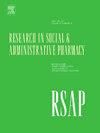药师主导的患者口服抗凝治疗教育的结果:范围综述。
IF 3.7
3区 医学
Q1 PUBLIC, ENVIRONMENTAL & OCCUPATIONAL HEALTH
Research in Social & Administrative Pharmacy
Pub Date : 2025-02-19
DOI:10.1016/j.sapharm.2025.02.009
引用次数: 0
摘要
背景:口服抗凝剂(OACs)通常用于预防和治疗非瓣膜性心房颤动(NVAF)患者的血栓栓塞和卒中预防。维生素K拮抗剂(VKAs)和直接口服抗凝剂(DOACs)治疗具有挑战性,因为可能存在出血风险。药师对患者进行教育有助于降低不良反应风险,改善治疗效果。目的:本综述旨在探讨药师主导的vka和DOACs治疗的患者教育干预的结果。方法:使用三个数据库(PubMed、Web of Science和Scopus),按照系统评价和荟萃分析扩展范围评价的首选报告项目(PRISMA-ScR)指南来识别2008年1月1日至2024年12月31日之间发表的文章。这些数据是用Rayyan AI合成的。结果:共鉴定出1102份病历。经过标题和摘要筛选,77项研究被纳入全文综述,最终纳入57篇文章。检查vka、doac和两者(oac)的研究百分比分别为66.7%、19.3%和14.0%。81.6%(31 / 38)的vka研究、36.4%(4 / 11)的doac研究和50%(4 / 8)的oac研究中至少发现了一个具有统计学意义的结局。结论:本综述显示,药师主导的患者教育在vka病例中特别有效,而在doac病例中效果一般。此外,虽然药剂师在vka患者教育中的作用已被广泛研究,但很少有研究关注药剂师主导的教育对doac的影响。本文章由计算机程序翻译,如有差异,请以英文原文为准。
Outcomes of pharmacist-led patient education on oral anticoagulant therapy: A scoping review
Background
Oral anticoagulants (OACs) are commonly used to prevent and treat thromboembolism and stroke prevention in patients with nonvalvular atrial fibrillation (NVAF). Vitamin K antagonist (VKAs) and direct oral anticoagulant (DOACs) therapies are challenging because of the possible risk of bleeding. Patient education by pharmacists could be beneficial for reducing the risk of adverse effects and improving therapeutic outcomes.
Objective
This scoping review aimed to investigate the outcomes of pharmacist-led patient education interventions regarding VKAs and DOACs therapies.
Method
Three databases (PubMed, Web of Science, and Scopus) were used following the Preferred Reporting Items for Systematic Reviews and Meta-Analyses Extension for Scoping Reviews (PRISMA-ScR) guidelines to identify articles published between January 1, 2008, and December 31, 2024. The data were synthesized using Rayyan AI.
Results
A total of 1102 records were identified. After title and abstract screening, 77 studies were selected for full-text review, and 57 articles were ultimately included. The percentages of studies that examined VKAs, DOACs, and both (OACs) were 66.7 %, 19.3 %, and 14.0 %, respectively. At least one statistically significant outcome was detected in 81.6 % (31 out of 38) of the studies on VKAs, 36.4 % (4 out of 11) of the studies on DOACs and 50 % (4 out of 8) of the studies on OACs.
Conclusion
This review revealed that pharmacist-led patient education was particularly effective in cases of VKAs, while the outcomes in cases of DOACs were modest. Moreover, while the role of pharmacists in patient education on VKAs has been widely studied, limited research has focused on the effect of pharmacist-led education on DOACs.
求助全文
通过发布文献求助,成功后即可免费获取论文全文。
去求助
来源期刊

Research in Social & Administrative Pharmacy
PUBLIC, ENVIRONMENTAL & OCCUPATIONAL HEALTH-
CiteScore
7.20
自引率
10.30%
发文量
225
审稿时长
47 days
期刊介绍:
Research in Social and Administrative Pharmacy (RSAP) is a quarterly publication featuring original scientific reports and comprehensive review articles in the social and administrative pharmaceutical sciences. Topics of interest include outcomes evaluation of products, programs, or services; pharmacoepidemiology; medication adherence; direct-to-consumer advertising of prescription medications; disease state management; health systems reform; drug marketing; medication distribution systems such as e-prescribing; web-based pharmaceutical/medical services; drug commerce and re-importation; and health professions workforce issues.
 求助内容:
求助内容: 应助结果提醒方式:
应助结果提醒方式:


